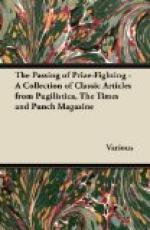* * * * *
The publishers, in their preface to Mr. HUGH SPENDER’S new novel, The Seekers (COLLINS), led me to believe that it was written with the object of denouncing the dangers and the frauds of spiritualism. This, however, is by no means the case. To be sure the first few chapters do contain an account of a seance, which serves not so much to lay bare the mysteries of spiritualism as to bring together a few of the characters in the novel. From that point onward there is nothing more about spooks, save for an occasional reference. It is when the dramatis personae have been well collected in and about a Yorkshire vicarage that things really get a move on and begin to hum. No reader is entitled to complain of a lack of excitement; the mortality, indeed, is almost Shakspearean. Rudge, a medium, who must not be confused with our old friend, Mr. Sludge, perishes in a snowstorm. John Havering batters in the head of Hubert Kenyon, and later on commits suicide, while Beaufort, a Labour leader, is wrongfully charged with the murder of Hubert and barely escapes with his life. Everything however ends comparatively well, owing to a strong female interest. Mr. SPENDER is usually a careful workman, but sometimes his sentences get the better of him. Here is one such: “She wondered if Peter, who must have seen Mary as he came into the vicarage disappear into the study, had gone in, hoping to find her there as he left the house.” It is not often however that Mr. SPENDER leaves his clauses to fight it out together like that.
* * * * *
In The Golden Rope (LANE) Mr. J.W. BRODIE-INNES has tried to combine a tale of mystery and murder with the love-story of a man of fifty; and, on the whole, it is a fairly successful effort. Alan Maclean, the middle-aged one, who tells the tale, was a celebrated artist, and, when he made his way to Devon to paint Pontylanyon Castle, he little expected to find himself involved in a maze of intrigue and adventure. The castle, however, was owned by a lady of great but unfortunate possessions. In the first place she had a dual personality (and, believe me, it is the very deuce to have a dual personality); and, secondly, she possessed a crowd of relatives (Austrian) who wanted




